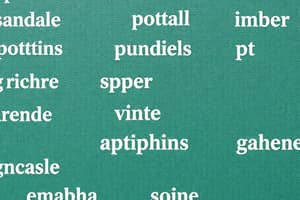Podcast
Questions and Answers
Синонимдер мен гомонимдердің арасындағы айырмашылық қандай?
Синонимдер мен гомонимдердің арасындағы айырмашылық қандай?
- Синонимдер бірдей айтылатын, бірақ әртүрлі мағынасы бар сөздер.
- Синонимдер бірдей жазылатын, бірақ әртүрлі айтылатын сөздер.
- Гомонимдер бірдей мағынасы бар, бірақ әртүрлі жазылған сөздер.
- Гомонимдер әрқашан бірдей жазылған, бірақ әртүрлі мағынасы бар сөздер. (correct)
Бұл сөздердің қайсысы 'жақсы' синонимі бола алады?
Бұл сөздердің қайсысы 'жақсы' синонимі бола алады?
- Тамаша (correct)
- Қатты
- Кіші
- Ашуланған
Синонимдермен байланысты мәселе қандай?
Синонимдермен байланысты мәселе қандай?
- Синонимдер тек бір тілде ғана бар.
- Кейбір сөздердің шынайы синонимі жоқ. (correct)
- Синонимдер әрқашан бірдей қолданылуы керек.
- Синонимдерді табу әрқашан оңай.
Гомографтың анықтамасы қандай?
Гомографтың анықтамасы қандай?
Бұл сөздердің қайсысы 'жылдам' синонимі болып табылады?
Бұл сөздердің қайсысы 'жылдам' синонимі болып табылады?
Синонимдар арасындағы ең үлкен ұқсастық деңгейін сипаттайтын синоним түрі қандай?
Синонимдар арасындағы ең үлкен ұқсастық деңгейін сипаттайтын синоним түрі қандай?
Синоним таңдауына әсер ететін факторлардың бірі не?
Синоним таңдауына әсер ететін факторлардың бірі не?
Синонимдардың не үшін пайдаланылатынының бірі неде?
Синонимдардың не үшін пайдаланылатынының бірі неде?
Синонимдар қандай жағдайда синоним ретінде пайдаланылуы мүмкін?
Синонимдар қандай жағдайда синоним ретінде пайдаланылуы мүмкін?
Синонимдардың қандай түрі ең жиі кездеседі?
Синонимдардың қандай түрі ең жиі кездеседі?
Flashcards
Синонимдер
Синонимдер
Мағынасы ұқсас сөздер
Омонимдер
Омонимдер
Жазуы немесе айтылуы бірдей, бірақ мағынасы әртүрлі сөздер
Омографтар
Омографтар
Жазуы бірдей, бірақ айтылуы және мағынасы әртүрлі сөздер
Омофондар
Омофондар
Signup and view all the flashcards
Синонимдердің шектеулері
Синонимдердің шектеулері
Signup and view all the flashcards
Синоним деген не?
Синоним деген не?
Signup and view all the flashcards
Толық синоним деген не?
Толық синоним деген не?
Signup and view all the flashcards
Жақын синоним деген не?
Жақын синоним деген не?
Signup and view all the flashcards
Контексттік синоним деген не?
Контексттік синоним деген не?
Signup and view all the flashcards
Синонимдерді не үшін пайдаланамыз?
Синонимдерді не үшін пайдаланамыз?
Signup and view all the flashcards
Study Notes
Definition of Synonym
- A synonym is a word, morpheme, or phrase that has the same or nearly the same meaning as another word, morpheme, or phrase in a given language.
- Synonyms often share a semantic field or category, but they may differ in other aspects, such as connotation, collocation, or register.
- The degree of similarity between synonyms can vary greatly; some are near-perfect equivalents, while others are more nuanced in their differences.
Types of Synonyms
- Perfect Synonyms: Words that have identical meanings in all contexts. Finding perfect synonyms is often rare in everyday language.
- Near Synonyms/Close Synonyms: Words with similar meanings but slight differences in nuance, connotation, or usage. These are the most common type in practical language use. The distinctions are important for accurate communication.
- Contextual Synonyms: Words that have the same meaning only within a specific context or situation. Their meanings can differ in other uses. This highlights the importance of considering context.
Factors Determining the Choice of a Synonym
- Connotation: The emotional or suggestive meaning associated with a word. A synonym might have a different emotional tone, so careful selection is crucial.
- Collocation: The tendency of words to appear together frequently. Some words are tied to specific contexts, and their synonyms may not fit equally well.
- Register: The level of formality or informality of a word. A synonym might be more appropriate for a formal or informal setting.
- Formality/Informality: Formal synonyms are more suited for academic writing; informal ones for casual conversations.
- Figurative Language: Certain synonyms may work only in metaphorical or figurative speech.
- Intensity of meaning: Some synonyms vary in the degree of intensity of the conveyed feeling, e.g., "angry" and "furious."
Use of Synonyms in Language
- Increased vocabulary: Using synonyms enriches language and expressions, preventing repetition and producing more precise communication.
- Figurative language/vividness: Using appropriate synonyms enhances description and creativity.
- Avoiding repetition: Replacing repeated words with synonyms maintains reader interest and prevents monotony.
- Clarity and precision: Choosing the right synonym improves comprehension by conveying a more accurate meaning.
- Tone and style: The choice of synonyms influences the overall tone of the text or speech.
- Emphasis or emphasis lack: Some synonyms can elevate or diminish the importance a text attributes to a concept or idea.
Differences between Synonym and Homonym
- Synonyms: Words with similar meanings.
- Homonyms: Words that share the same spelling or pronunciation but have different meanings.
- Homographs: Same spelling but different pronunciation and meaning (e.g., "lead" – the metal and "lead" – to guide).
- Homophones: Same pronunciation but different spelling and meaning (e.g., "to," "two," and "too").
Examples of Synonyms
- Sad: unhappy, sorrowful, dejected, mournful, distressed.
- Big: large, huge, enormous, vast, substantial.
- Fast: quick, rapid, speedy, swift, brisk.
Limitations and Challenges
- Finding perfect synonyms can be difficult or impossible in specific contexts.
- Some words do not have true synonyms.
- Nuances of meaning and context can make exact replacements challenging.
- Determining the accuracy of translation across languages can be complex.
Studying That Suits You
Use AI to generate personalized quizzes and flashcards to suit your learning preferences.




